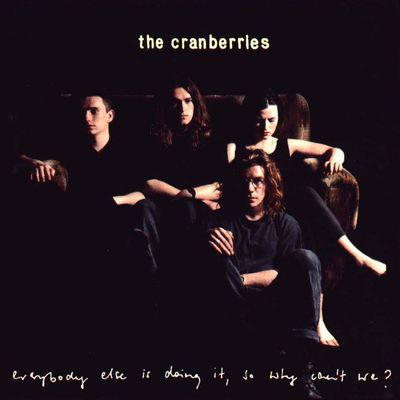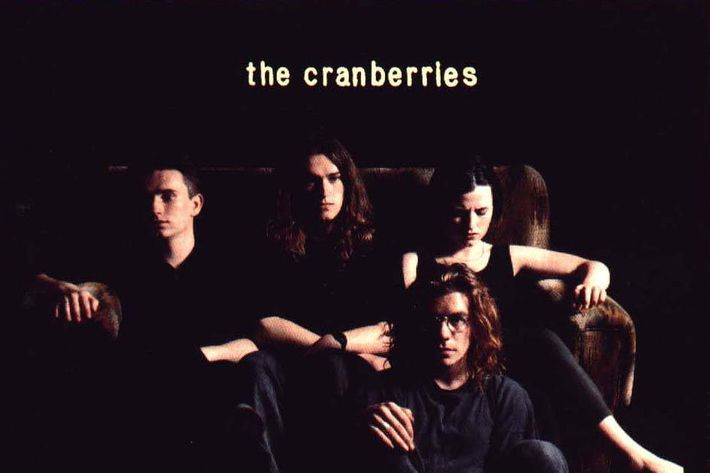

The Nostalgia Fact-Check is a recurring Vulture feature in which we revisit a seminal movie, TV show, or album that reflexively evinces an “Oh my God, that was the best ever!” response by a certain demographic, owing to it having been imprinted on them early. Now, years later, we will take a look at these classics in a more objective, unforgiving adult light: Are they really the best ever? How do they hold up now? We’ve already reconsidered a bunch of things. Next up: the Cranberries’ Everybody Else Is Doing It, So Why Can’t We?
Background: The Cranberries, a nineties Irish rock band fronted by the uncannily voiced, Sinead O’Connor–esque Dolores O’Riordan, released their debut album, Everybody Else Is Doing It, So Why Can’t We? in early 1993. The album floundered in the U.K. until “Linger,” its sweeping lead single, found a following on MTV and eventually cracked the Billboard “Top 10” in early 1994; “Dreams” and two singles off a second album (“Zombie” and “Ode to My Family”) soon achieved respectable, if slightly reduced, levels of radio play. The Cranberries were big players in the mid-nineties popular light-alternative scene until the release of their third album, To the Faithful Departed, which met with indifference owing in part to its heavily political tone. The band released two more albums before announcing an extended hiatus in 2003.
Nostalgia Demo: More or less, anyone with a radio and an appreciation for well-crafted pop music in 1994. (If you have ears to hear, you’ve had “Zombie” stuck in your head before.) There’s definitely a gender bias on this album: Women will freely admit their love for “Linger,” while men are a bit more reluctant to admit that they know every word. But they do.
Nostalgic Fact-Check: Do you remember the first time you went to a Starbucks? I don’t specifically, but when I imagine this momentous nineties event, I’m sure that I ordered a mocha latte, and I’m sure that the Cranberries were playing in the store. This is another way of saying that Everybody Else Is Doing It, So Why Can’t We? occupies an exact, associative nostalgia niche for me — it soundtracks the nineties in my head. It should also be noted, at this point, that I really liked the Cranberries. “Linger” hit the charts just as this devoted “Top 40” fan was ready to graduate from Soul Asylum and the Spin Doctors, but wasn’t quite ready to deal with Soundgarden’s Superunknown or Pearl Jam’s Vitalogy. To a young, untrained ear, the Cranberries sounded like grown-up music, the kind of thing you expected to hear in a college dorm room (at least, the college dorm rooms I saw in movies). It was grungier — again, our standard of comparison here is “Runaway Train” — but not actually grunge. Most important, I could tell the front woman felt very strongly about what she was singing, and since she didn’t sing about anything particularly specific, I could feel strongly, too. And I did: I very specifically remember defending Dolores O’Riordan’s unique accent to a hateful, country-loving boy in my carpool. I meant every word.
It pleases me to report, then, that Everybody Else Is Doing It, So Why Can’t We? is still a perfectly respectable, if not groundbreaking, alternative-pop album. Its lyrics don’t challenge the adult mind quite so vigorously as they did a preteen, and the distorted guitar riffs tends to blur together on the lesser tracks, but that voice! The voice is still undeniable. It wails and “oohs” and twists English vowels in indecipherable ways; it’s folksy and warm and desperate, all at the same time. On this album, it sings urgently and exclusively about love — found, briefly enjoyed, and then lost, it seems, in an arc over the course of the twelve tracks. By the tenth track or so, you maybe wish that O’Riordan would accept the loss (dude played some major games! We get it), or at least find a few new words to replace the random vowels and “la la”s that communicate her anguish. But for the most part, the lyrics don’t matter: It’s the lovely, lush melodies, sung in O’Riordan’s mournful Irish yelp, that take the Cranberries from generic strummy alt band to nineties-time-capsule classic.
“Linger,” as you’d expect, is still the standout, thanks in part to a string backing that matches and enhances O’Riordans vocals. Plus: heartbreak. “Linger”’ asks the important universal questions: Why were you holding her hand? Was it just a game to you? Etc. That dreamy string melody soars along over the rejection, making it bearable, and then Dolores brings out the big, fool-for-you chorus. Here’s an important international-relations question: How many of you, in public, have tried to imitate that beautifully odd “lingeaahr” that O’Riordan throws out at the end of every “Do you have to let it?” Follow-up: Has anyone ever made some sort of formal collective apology to the people of Ireland for these embarrassing vowel atrocities? Something to consider, probably, in the interest of diplomacy.
Another highlight: “Dreams,” a sunny, ethereal confessional, topped off with some celebratory yodeling for good measure. A brief survey of IMDb indicates that “Dreams” is the Cranberries song most frequently used on soundtracks — you might remember it from The Next Karate Kid, or The Babysitters’ Club trailer, or that early scene in You’ve Got Mail when Meg Ryan waxes poetic about New York in the fall. Given its cultural application, you’d expect “Dreams” to be a little sappy, and without O’Riordan, the track wouldn’t sound out of place on a Coldplay album. But the begging in her voice is unmistakable; when she sings “you have my heart, so don’t hurt me,” the last phrase is staccato, each word a new plea. The album is full of moments like this, when the edge in O’Riordan’s voice transforms an otherwise forgettable lyric into something remarkable. Her band, wisely, gets out of the way and lets it happen.
A few other tracks worth mentioning individually: “I Will Always,” which falls solidly in the love-lost section of the album, starts as a “Please Please Please Let Me Get What I Want” homage but crescendos into a spare, beautiful chorus with a bummer of a good-bye; “Sunday,” with its extended violin intro, exemplifies the band’s surprisingly deft use of strings; and “How,” the penultimate track, features a dark guitar riff that previews the band’s aggression on future albums. The rest of Everybody Else is perfectly serviceable, if slightly moody, gentle alt rock: fuzzy guitars, pining in a minor key, ambiguous lyrics about wanting things and people. It evokes plaid and Empire Records (or, Liv Tyler’s safety-pinned plaid skirt from Empire Records). It’s the kind of stuff that, had you been of making out age in 1994, you definitely could have made out to.
But wait, you’re probably thinking, What about “Zombie?” This is a fair question. “Zombie,” along with the gut-wrenching “Ode to My Family,” appeared on the Cranberries’ second album, No Need to Argue, which followed closely after Everyone Else in October 1994. As such, it does not strictly fall under the parameters of this fact-check, but allow us to give a brief review of both singles: They’re still awesome. “Ode to My Family,” with its haunting “Does Anyone Care?” chorus, ages better than the slightly clumsy political statement about an IRA bombing, but yelling “Zombie-ah ie-ah ie-ah ie-ah” does, in fact, remain really fun.
Had one colossally catchy rant been the limit of the Cranberries’ social activism, maybe we would have another handful of shimmering late-nineties singles to sing unironically at karaoke. Instead, the band zeroed in on current events. Their third album, To the Faithful Departed, is chock-full of references to war and strife, and its sales dwindled as a result. The Cranberries basically, uh, did not linger from there, and though they’ve announced a new album, due some time next year, it’s hard to imagine they’ll ever outshine their mid-nineties achievement. That’s okay with this fan. There are plenty of indie female singers writing folksy love songs in 2011, and we don’t need a new “Linger”; the first one plays just fine. Everybody Else works as a pleasing, totally listenable throwback — a reminder of a particular musical era, and also maybe of a personal era, when we listened to music without being so worried about what it all meant. It was impossible to tell, anyway, with that crazy accent; better to just sing along, weird “aarhs” and all.




